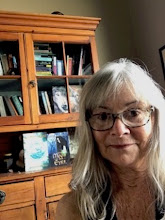I'm not even sure where I read this, but the advice was to keep the reader turning pages by ending every chapter with a hook--what will happen next?
This can be done several ways--by someone running for their lives or by simply ending the chapter with a question. Will she make it to the town in time to stop the insurrection? We don't know and so we turn the page.
I find myself doing this automatically now, and many times I'll come up with a sentence that seems like the end of a chapter when in reality the chapter is too short and needs to go on.
How about the hook at the beginning? The adage of 'start your story with a major hook and then keep the suspense building' is a good one. But at some point we need to hear the backstory, or the narrative has no depth. Who is this woman who's running from the law? Why does she keep doing stupid things? What in her background would account for this? Don't do an info dump, just weave it in when you need to slow down the action.
One of the things I've discovered is that when the narrative moves too quickly, it's as though we don't have time to take a breath. As a writer, breathe in and relax a moment, bringing the reader into the present, and then get in touch with what the main character is feeling. Take a short hiatus and then you can heighten the tension again. It's like mixing staccato sentences in with longer ones--they all have their place but if you overdo one or the other it makes for a less engaging story. It's like a symphony in which the music changes from fast-paced, to slow and steady.
But first and foremost be interested in what you're writing. Be there in the scene, visualize the booming cannon as it kicks backward, emitting a plume of smoke, hear what it does to your eardrums, see the sparks and the smoke from the explosion, smell the cordite. This is where you hook your reader because you've brought them directly into the action.
The more engaged you are the better it will be.
Thanks for reading and comments are most appreciated!

Nikki,
ReplyDeleteYou've done a good service by broadening the meaning of "hook." The most forgotten hook is the one you alluded to: each word in a sentence; each sentence in the paragraph.
Thanks for commenting, Dane...yup, entire book needs to be the hook, doesn't it?
DeleteI suppose the bottom line is that in no chapter should the writer be bored. Whether reading or writing I always want to know what's going to happen next. I can wait...but I have to know there there is something coming up.
ReplyDeleteOn another issue, one which may be encouraging in that you certainly seem to be following the advice - How true is this perhaps over postive article?
http://www.deanwesleysmith.com/killing-the-top-ten-sacred-cows-of-indie-publishing-7-i-have-to-sell-books-quickly/
thanks for this, Mike--very good way of looking at things! It's hard not to fall into the trap but climbing out seems to be getting easier. How's yours?
ReplyDeleteThat damned hook! :) Great explanation Nikki.
ReplyDeleteshahwharton.com
thanks, Shah!
Delete